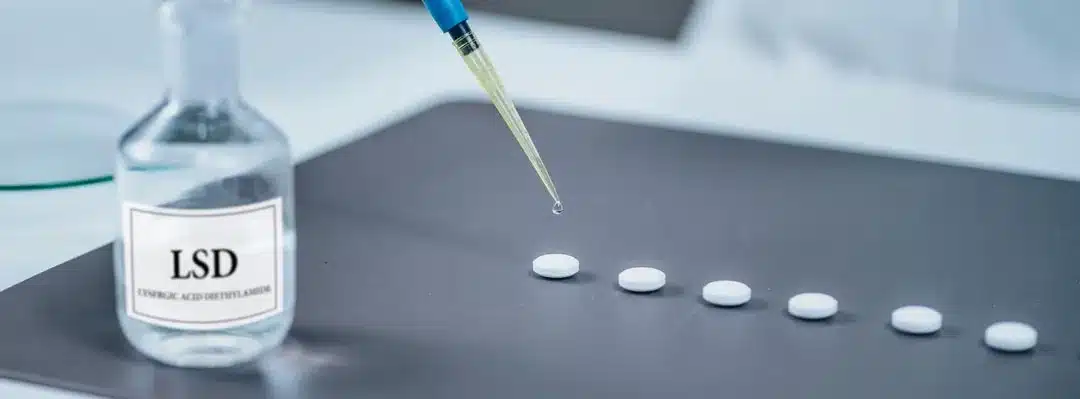Looking at the Lethal Potential for Lysergic Acid
A recent study by researchers at Columbia University showed that more than 5.5 million U.S. residents regularly use some type of hallucinogenic drug. It also showed that, while the use of drugs like ecstasy and PCP is decreasing, others, like LSD, are trending upward.
LSD is a dangerous drug with powerful chemical and psychological effects. Use can result in adverse health outcomes, including those that warrant hospitalization.
Can LSD kill you? Although it’s rare, you can overdose on LSD. However, the dangers associated with LSD use are not isolated to life and death.
This article explains how LSD works and its effects on the brain and the rest of the body. It will give you an idea of the risks involved in taking this drug, as well as some advice on recovery options for addiction.
What Is LSD?
LSD is a synthetic drug, meaning it does not derive from plants or other natural sources but is created by humans. One of the main chemicals is derived from ergot, a fungus that infects rye.
LSD is a potent psychedelic substance used for recreational purposes. It’s odorless and colorless, and it has a bitter taste.
LSD is also commonly referred to as “acid” or “blotter acid.” This is a reference to the way LSD is typically consumed, which is by eating a saturated absorbent square of paper. LSD can also be consumed in liquid form.
“LSD” stands for “lysergic acid diethylamide.” It was first synthesized in 1938 by a Swiss chemist. Over the next several decades, the chemical was used for various research and treatments, including alcoholism.
LSD became prevalent as a recreational drug during the 1960s. It was a big part of the hippie counterculture movement.
During the 1970s, the U.S. Drug Enforcement Agency classified LSD as a Schedule 1 drug. This designation means it has a high potential for abuse with no accepted medical use.
How Does LSD Work?

LSD belongs to a class of drugs known as hallucinogens. As the name suggests, these cause people to hallucinate-they may hear or experience things as being real but are only created by the mind.
They might experience distorted perceptions of colors, sounds, objects, and movements. While on a “trip,” individuals can undergo a contorted experience of time.
LSD works by interacting with serotonin receptors, which are proteins on the surface of brain cells. Serotonin is a chemical that allows the cells to communicate.
LSD changes the way this happens. Also, receptors hold on to LSD, which makes it long-lasting. Acid trips can extend for up to 12 hours or longer.
What Are the Effects of LSD?
Besides hallucinations, LSD can bring about harmful health effects. These include dry mouth, dilated pupils, sweating, and increased heart rate and blood pressure.
When coming down from an LSD trip, users may experience extreme fatigue and muscle aches. They could develop severe depression and insomnia for several days (or longer) following the experience.
LSD can also have long-term effects on the brain. A common one is called hallucinogenic persisting perception disorder (HPPD). This is a clinical term that refers to flashbacks to some of the psychedelic effects of an LSD trip.
These can include auditory or visible hallucinations that relate to the experience of being high on LSD. Individuals have reported seeing shining “trails” attached to objects or in their peripheral vision.
Note that this happens when there are no drugs in the person’s system. Also, some people have experienced these after only taking LSD once. There are treatments for HPPD, including medications that can be effective at managing symptoms.
Is LSD Addictive?

LSD is not physically addictive like heroin or opioids. Even taking it on a regular basis will not produce withdrawal symptoms related to the drug (although you may experience some of the residual side effects described above). LSD can be habit-forming though, especially for people who regularly abuse other drugs.
Also, people can develop a tolerance to LSD. That means that frequent users have to increase the dose of LSD to achieve the same effects. This can increase the risks associated with the drug.
Can LSD Kill You?
As mentioned, LSD overdose is rare. However, it does happen.
Taking too much LSD can lead to other health problems though, some of which can be quite dangerous. These include vomiting and trouble breathing. It can trigger psychosis and seizures, and render you unconscious.
A better question may not be “Can LSD kill you?” but what effects could it have that could lead to deadly behavior? While LSD overdose is rare, “bad trips” are not. These often lead to poor decisions that put the user in danger.
This includes engaging in dangerous behaviors that lead to personal injury. There have been incidents of people jumping out of windows, running into traffic, or threatening law enforcement personnel in an altered state. While impaired, they may experience extreme anxiety that can increase the risk of suicide.
The Uncertainty of LSD Quality and Purity
There is a third major way that LSD can be dangerous and even life-threatening. This is if it’s supplemented or mixed with other common psychoactive substances, including NBOMes, or “N-Bombs.”
These are highly toxic substances that only recently emerged onto the illegal drug market. While they produce some of the same psychoactive results as LSD, their side effects are much more dangerous.
People who have overdosed on NBOMes had signs of seizure, kidney failure, and difficulty breathing. There is also some suspicion that the LSD-like effects of these drugs, like confusion and hallucinations, are much more intense. Finally, research into NBOMes shows that a large percentage of the people hospitalized or who died may have believed they had taken LSD.
Get Drug Rehab Support at Purpose

Now that you have a more comprehensive answer to “Can LSD kill you?” you can understand the dangers of the drug, including health risks. LSD is a powerful hallucinogen that can be life-threatening. It involves risks that are not worth taking.
Purpose Healing Center is a leader in the behavioral health care industry. We provide the highest quality substance abuse treatment at both our Phoenix and Scottsdale campuses and work with most insurance companies. Reach out to us today to learn more or schedule treatment now!



